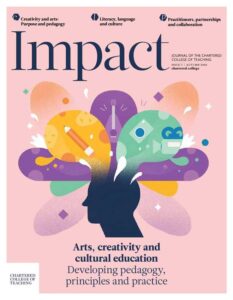Research-based training – translating evidence into practice one bite at a time

We believe that great art and culture inspires us, brings us together and teaches us about ourselves and the world around us. In short, it makes life better.
Arts Council England website
Literacy training needs to be a focus for all schools because a solid foundation in reading and writing can provide a springboard for future interactions in all areas of cultural education. The 2012 review ‘Cultural education in England’ (Henley, 2012) explains how the quality of the interaction that children first have with cultural experiences is of the ‘upmost importance’. Reading books and writing stories are listed as key activities that all children should have undertaken by the age of 11, so it is imperative that these cultural experiences are provided by teachers who have received high-quality literacy training.
This case study will reflect on a new approach to delivering training for reading and writing called #literacybites. At the centre of this approach is an in-depth look at the Education Endowment Foundation’s (EEF) Key Stage 1 and Key Stage 2 literacy guidance reports (2017a, 2017b) and how, in bite-sized chunks, this research can be translated into high-quality teaching practice.
In my role as an evidence lead in education (ELE) for the Aspirer Research School, I support teachers to engage with research in both a practical and a theoretical way. I collaborate with teachers to identify the research that is relevant to them and to help them to understand how to apply it within their context. It was in this capacity that I co-delivered the #literacybites training programme.
Instead of delivering a one-, two- or even three-day training event, each session lasted 90 minutes and focused on one recommendation of the guidance report. This approach allowed us to dig deeper into how the research might be used to develop practice in Key Stage 1 and then in Key Stage 2. We ran two sessions consecutively per day (1:30–3:00pm and 3:30–5:00pm), which we repeated over four weeks: eight sessions in total (see Table 1).
| Recommendation 1: oral language | Session 1a: Language and communication |
| Session 1b: Reading as a social activity (reading for pleasure) | |
| Recommendations 2, 3 and 4: reading | Session 2a: A balanced approach – decoding |
| Session 2b: A balanced approach – comprehension | |
| Recommendations 4 and 5: writing | Session 3a: Writing – transcription |
| Session 3b: – Writing – composition | |
| Recommendation 6: assessment | Session 4a: Diagnostic assessments – reading |
| Session 4b: Diagnostic assessments – writing |
Table 1: Training programme session outlines
Each session followed the same outline.
- We looked at the recommendation that we were focusing on and unpicked the key messages for Key Stage 1 and Key Stage 2. For example, in Session 2b we shared the importance of modelling and teaching each specific comprehension strategy (prediction, questioning, clarifying, summarising, inference and activating prior knowledge) to pupils so that they know when to use them to form their own meaning about a text.
- We took a deep-dive into the research, which was referenced in the reports, around the recommendation. For example, we discussed the ‘gradual release of responsibility’ model and the implications that it would have for their classrooms.
- We demonstrated how the research could be translated into their own classrooms and provided time for consideration of their ideas and thoughts with the group. This was achieved using a series of activities. For example, we used Activity 1.1 from Understanding and Teaching Reading Comprehension (Oakhill et al., 2015, p. 2) to highlight the importance of children having a mental model in order to achieve that ‘comprehension click’.
As we began to learn more about the group, their students and contexts, we were able to tailor the sessions, making them more relevant, efficient and effective.
Initially the training programme was promoted as a ‘pick and mix’, whereby teachers could choose the most relevant sessions. However, we ended up with a core group who attended them all and it became clear that this was the most beneficial way to engage. Because of the repeated attendance, the course became more of a ‘professional development programme’ (DfEDepartment for Education - a ministerial department responsi, 2016, p. 5), as teachers were given the time to refine and embed approaches. Fullan and Hargreaves (2016) conclude that collaborative professionalism is vital for both professional learning and professional development, and this was clear from the feedback received after this course. Those who attended felt that the bite-sized chunks allowed them the opportunity to reflect on and discuss their next steps with other colleagues. Furthermore, they found that the shorter time slots maintained their engagement and they left each session with clear messages and ideas to implement immediately.
Overall, #literacybites is a new approach that meets the four standards set out by the DfE: it is focused on improving student outcomes, underpinned by robust evidence and expertise, includes collaboration and expert challenge, and was sustained over a period of time (DfE, 2016, p. 6).
References
Arts Council England (nd) About us. Available at: www.artscouncil.org.uk/about-us-0 (accessed 28 May 2019).
Department for EducationThe ministerial department responsible for children’s serv (DfE) (2016) Standard for teachers’ professional development. Available at: https://assets.publishing.service.gov.uk/government/uploads/system/uploads/attachment_data/file/537031/160712_-_PD_Expert_Group_Guidance.pdf (accessed 30 July 2019).
Education Endowment Foundation (2017a) Improving Literacy in Key Stage 1. London: Education Endowment Foundation.
Education Endowment Foundation (2017b) Improving Literacy in Key Stage 2. London: Education Endowment Foundation.
Fullan M and Hargreaves A (2016) Bringing the Profession Back in: Call to Action. Oxford, OH: Learning Forward.
Henley D (2012) Cultural education In England: An independent review by Darren Henley for the Department for Culture, Media and Sport and the Department for Education. Available at: https://assets.publishing.service.gov.uk/government/uploads/system/uploads/attachment_data/file/260726/Cultural_Education_report.pdf (accessed 28 May 2019).
Oakhill J, Cain K and Elbro C (2015) Understanding and Teaching Reading Comprehension: A Handbook. Oxon: Routledge.










